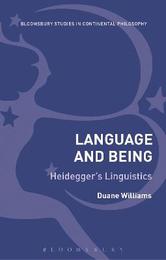
|
Language and Being: Heidegger's Linguistics
Hardback
Main Details
Description
Martin Heidegger's radical and, for that, controversial reflections on language were not simply a passing interest in his thinking, but a fundamental, career-long concern arguably as significant to him as his study of being. This book traces the intimate connection between language and being in Heidegger's philosophy, and shows how they cannot be understood apart from one another. It discusses why Heidegger's undervalued philosophy of language is increasingly important, how it figures in the wider context of his work, and how it is to be approached and understood for our times. This includes the significance to Heidegger of being, the logos principle, etymology, phenomenology, mysticism, and poetry. Illuminating a difficult yet highly significant area in Heidegger's thinking, Williams provides an insightful and authoritative interpretation of the topic.
Author Biography
Duane Williams teaches and researches in the Theology, Philosophy and Religious Studies Department at Liverpool Hope University. His first book, The Linguistic Christ was published in 2011. He is the editor of Medieval Mystical Theology: The Journal of the Eckhart Society, and co-facilitator of the Association for Continental Philosophy of Religion.
ReviewsOne of the virtues of this study is its direct and accessible style ... [It] offers a helpful interpretation of the relation of language and Being in Heidegger's thought, and can be recommended as providing a courageous effort to grapple with an immensely difficult topic. * Notre Dame Philosophical Reviews * Duane Williams' new book is a further sign that Heidegger scholarship in Britain is alive and well. In this sustained and intensely focused exposition of what Heidegger can teach us about language Williams not only helps Heidegger beginners and sceptics to see that something important is going on in these texts, but also offers new insight to established Heidegger readers. Williams is especially attentive to the proximity of Heideggerian thinking to mystical and East Asian thought as well as to its poetic dimension. He shows how Heidegger can assist us in reflecting on human beings' spiritual needs in a time threatened by the seemingly unstoppable reduction of communication to information, management-speak, and data. -- George Pattison, Professor of Divinity at the University of Glasgow, UK
|